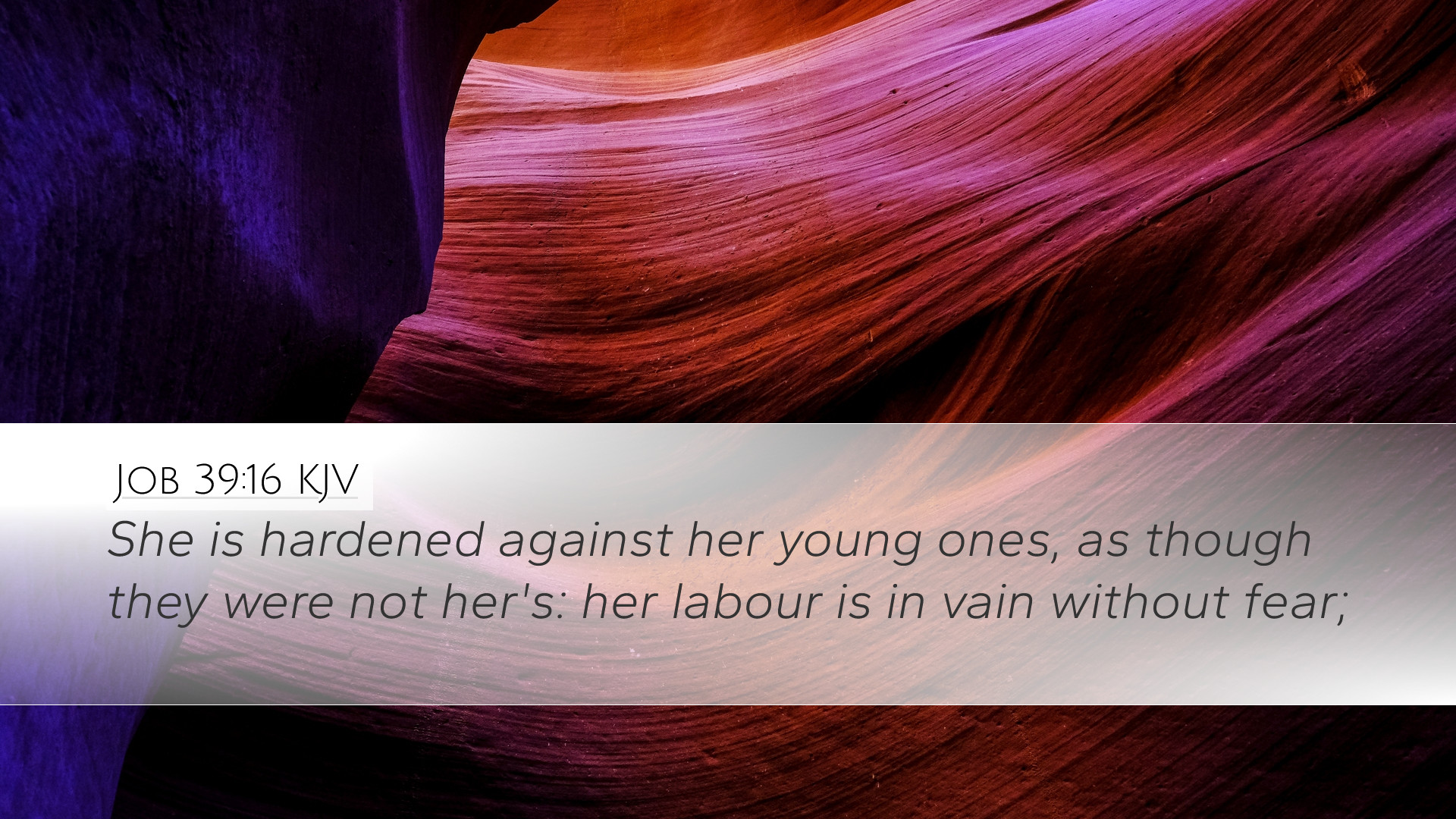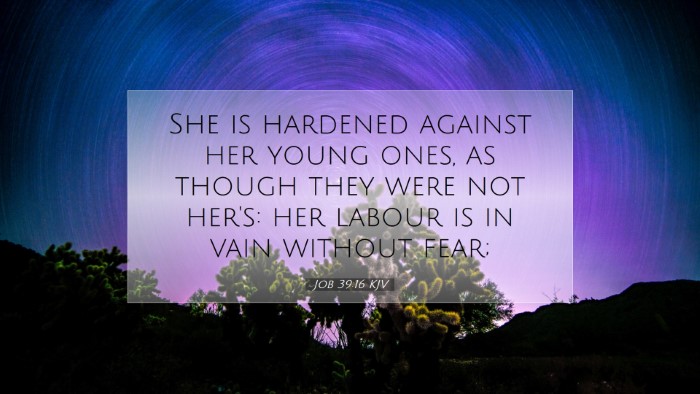Old Testament
Genesis Exodus Leviticus Numbers Deuteronomy Joshua Judges Ruth 1 Samuel 2 Samuel 1 Kings 2 Kings 1 Chronicles 2 Chronicles Ezra Nehemiah Esther Job Psalms Proverbs Ecclesiastes Song of Solomon Isaiah Jeremiah Lamentations Ezekiel Daniel Hosea Joel Amos Obadiah Jonah Micah Nahum Habakkuk Zephaniah Haggai Zechariah MalachiJob 39:16
Job 39:16 KJV
She is hardened against her young ones, as though they were not her's: her labour is in vain without fear;
Job 39:16 Bible Commentary
Commentary on Job 39:16
Job 39:16: "She is hardened against her young ones, as though they were not hers: her labour is in vain without fear."
Introduction
The verse from Job 39:16 draws attention to the nature of the ostrich, using it as a metaphor to illustrate deeper truths about care, neglect, and the consequences of one's actions. Public domain commentaries by noted scholars such as Matthew Henry, Albert Barnes, and Adam Clarke provide various insights that enrich our understanding of this verse.
Contextual Analysis
Job 39 is part of a larger discourse where God questions Job, showcasing the wonders of His creation and the limitations of human understanding. Here, the focus is on the ostrich, an animal that represents both amazing capabilities and profound shortcomings.
Heavenly Perspective
The verse is a part of God’s speech to Job, where He details the behavior of various creatures to assert His greatness in creation. By contrasting the strength of the ostrich with its lack of maternal instinct, God highlights His cosmic order, drawing attention to Job's misplaced understanding of suffering and divine justice.
Commentary Insights
Matthew Henry's Commentary
Matthew Henry emphasizes the ostrich's behavior as indicative of a lack of maternal nurture. He highlights how the ostrich, despite being capable of strength and agility, forsakes its young, thereby illustrating a profound lesson about the nature of motherhood.
- Fortitude without Care: Henry notes that the ostrich's strength is rendered futile due to its indifference towards its offspring.
- Lessons for Humanity: This can be interpreted as a call for humans to reflect on their responsibilities, particularly in spiritual leadership and nurturing roles.
Albert Barnes' Commentary
Albert Barnes provides a detailed exploration of the ostrich’s nature. He observes the behaviors of the ostrich in relation to its young ones, remarking how this bird is created with remarkable speed yet fails miserably in care.
- Symbol of Neglect: Barnes posits that this serves as a metaphor for neglect in life, suggesting that strength and ability must be coupled with responsibility.
- Divine Wisdom: He reflects on God’s wisdom in creating such an animal, drawing a parallel to the expectation placed upon humans regarding divine responsibility.
Adam Clarke's Commentary
Adam Clarke offers an additional perspective, linking the characteristics of the ostrich to the greater themes of inadequacy and human sinfulness. He contemplates the spiritual implications of the carelessness displayed by the ostrich.
- Comparison with Humanity: Clarke suggests that like the ostrich, humans often fail to recognize their spiritual duties towards others.
- God’s Sovereignty: His analysis reflects on God's sovereignty and how even flawed creatures have their purposes within divine order.
Theological Implications
This verse invites contemplation of several theological themes:
- The Nature of Creation: God's intricate design allows for creatures that exhibit both beauty and flaw, reflecting the complexity of the created order.
- Human Responsibility: The verse serves as a reminder that strength without responsibility is perilous, stressing the need for a balance between power and care.
- The Essence of Fear of God: There is the notion that true wisdom and fear of God lead to careful stewardship in all roles, especially those that concern others.
Conclusion
Job 39:16 challenges readers to reflect on their own lives and responsibilities. It underscores the importance of nurturing roles and the burdens of leadership, reminding us that power must be accompanied by a steadfast commitment to those we are called to serve. By examining this passage through the lens of these esteemed commentators, we uncover multi-faceted insights that speak deeply to our lives, work, and relationship with the divine.


